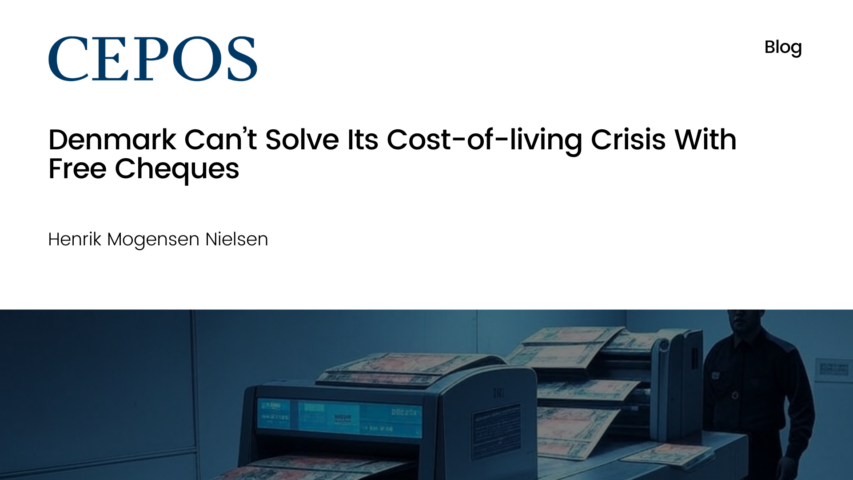Denmark Can’t Solve Its Cost-of-living Crisis With Free Cheques

Denmark Can’t Solve Its Cost-of-living Crisis With Free Cheques
Henrik Mogensen Nielsen // 28 September
In all likelihood, the Danes will have a general election within a month. Campaigning among the Danish politicians has been ongoing for months, although the election hasn’t been officially announced by the incumbent Social Democratic PM Mette Frederiksen. In a recent televised debate for candidates for prime minister, it became clear that sky-high inflation and Danes’ cost of living will play a central theme.
The Danish government has in recent months tried to remedy the cost-of-living crisis by issuing one-off cheques to 400,000 Danes for the equivalent of 800 Euros each, to deal with the rising energy costs in low-income households. A political move that in August resulted in a scandal when it was revealed that the Danish state had no overview of which Danes were to receive the funds, and thus had issued the cheques more or less arbitrarily in several instances.
On 1 September the Minister of Finance Nicolai Wammen announced the latest annual Finance Act, stating that the government has produced a “very strict Finance Act … to ensure that we do not push inflation further.” Sadly, the Finance Act continues on the usual Danish course, where the cost-of-living crisis must be remedied by cheques, such as a plan to hand out another 269 million Euros in so-called ‘inflation aid’, rather than stimulate the economy through political reforms and facilitate growth.
But is policy based on thoughts of a centrally planned economy really the best way to combat the inflation and cost of living crisis?
While the cheques may act as a short-term boost, they won’t solve the fundamental problem of either the high energy prices or the soaring prices on food, which not only the Danes but many Europeans suffer from due to the Russian invasion of Ukraine. One of the main reasons why electricity prices in Denmark are so high is attributed to Danish electricity tax, which makes up 39% of the total price. Instead, the Danish government should lower, or even better, abolish its taxes on electricity completely. Besides either reducing or abolishing the electricity tax, the Danish government could lower its VAT on 25% on all goods or services – one of the highest among EU member states, and the only country that does not have a reduced rate.
In a somewhat remarkable scheme, the state manages to make a fortune on added taxes on e.g., electricity and food, while handing people a mere fraction for their money back, in the form of a state-sponsored cheque as sign of their good will in time of crisis. At the same time, one must keep in mind that handing out cheques also only means an extension of inflation, as the compensation scheme is not matched by a reduction of the public sector or higher taxes. A basic economic principle that has been strangely dismissed by the Minister of Business Simon Kollerup.
In another political initiative, Frederiksen’s government also copied President Macron in France, and together with the Danish left-wing parties has urgently processed a law limiting rent rises of 4% annually, applicable for the next two years. With a cap on the increase of rent, the Danish government again effectively limits much needed growth in the economy at large, and severely restricts the construction and renovation sector, as it reduces the landlord’s incentives to maintain the houses and it also becomes less attractive to build new rental apartments.
While the cost of living is rising, the Danish government has chosen to preserve the economic status quo. The solution to the economic problems is not to be found by quickly fixing the Danes’ everyday household budget via cheques or limiting economic growth, such as restricting the construction sector. The solution is found in creating political reforms that facilitate competition through deregulation, so that Danish companies see an increase in productivity and thus the Danes’ wages.
In the upcoming election, one could fear that we’ll see more attempts to quick-fix the Danish economy. Instead, politicians in Denmark and elsewhere should be very cautious with limiting its citizens and companies’ abilities to foster and create economic growth. One thing is for certain: handing out cheques and other centrally planned economy schemes isn’t a viable long-term means to battle the cost-of-living crisis.
EPICENTER publications and contributions from our member think tanks are designed to promote the discussion of economic issues and the role of markets in solving economic and social problems. As with all EPICENTER publications, the views expressed here are those of the author and not EPICENTER or its member think tanks (which have no corporate view).



